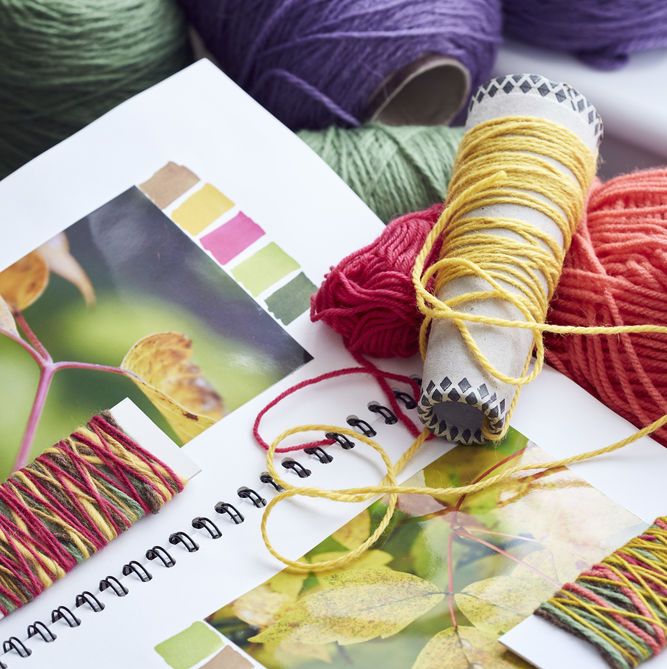Whether you’re an avid potter or can’t get enough of macrame, there’s now more research than ever to show that your favourite craft is having a positive effect on your health – both physical and mental.
Studies have shown that taking part in crafts is good for our heart health, cognitive function and stress levels. Keep reading to learn the top four reasons why crafting is so good for you…
Sitting down and getting stuck into a new creative project can help us feel refreshed and encourage us to unwind. This is particularly true if the activity in question lulls us into a meditative state and quietens our minds. Knitting, crocheting and cross stitch are all good examples.
Kerry Lord, founder of the knitting company, Toft, says: “Research indicates that the repetitive movements of crocheting can prompt the mind to relax, the heart rate and blood pressure to fall, and stress levels to drop.”
The team at Toft surveyed nearly 500 British women, and the respondents reported that crochet helped them with anxiety, depression and stress. Plus, it improved their mental health in general.
This has been backed by a study into the benefits of knitting for wellbeing by the Royal College of Occupational Therapists. After looking at data from 3,545 knitting enthusiasts, they concluded that: “Knitting has significant psychological and social benefits, which can contribute to wellbeing and quality of life.”
Similarly, Knit for Peace, a charity that pairs knitters with good causes, interviewed over 14,000 volunteers to uncover the health benefits knitting can bring. Their findings show that regular knitting helps to reduce depression, lower blood pressure and slow the onset of dementia.
Knitting can also alleviate chronic pain as the repetitive motion boosts serotonin levels and the mind’s attention is focused elsewhere.
Each time we create a hat, scarf or pair of gloves (even with a dropped stitch here and there), it boosts our confidence.
Speaking at the Country Living Christmas Fair, Dragon’s Den star and founder and owner of Crafter’s Companion, Sara Davies, shared: “You don’t have to be an expert [to craft], you don’t have to be artistic. I can’t draw for toffee. I would never consider myself artistic, but I love being in the moment [when I’m] doing a craft and I love how I feel when I’ve made something.”
Another firm believer of this is Betsan Corkhill, author, clinician and founder of Stitchlinks. Her craft-based organisation promotes therapeutic knitting and cross-stitching through the research it conducts. Along with teaching these skills, it also helps people set up their groups at schools, hospitals and workplaces.
Betsan says: “The benefits of learning a new skill can be felt immediately. The feel-good factor, sense of excitement and achievement on mastering a new task, particularly a challenging one, is fantastic and is a tremendous boost to self-esteem and confidence.”
We could all benefit from time spent brushing up on our cognitive skills. The good news is that it doesn’t have to feel like a chore. Leisurely crafts have all the benefits needed to improve our brain power.
KnitHub 24 say: “Recently, there have been more and more studies researching the healing benefits of slow craft forms, including knitting. The practice of knitting is similar to that of playing the piano. Both activities require you to use both hands to make different moves. This simultaneous and coordinated movement stimulates both sides of the brain.
“Knitting also holds similar benefits to doing complex crossword puzzles or Suduko. Regular practice improves concentration, pattern recognition and memory.”
The Campaign to End Loneliness has reported that a huge 45% of adults in England feel lonely occasionally, sometimes, or often. This equates to around 25 million people. Research shows that loneliness not only puts individuals at greater risk of cognitive decline and dementia, but also increases the risk of high blood pressure, heart disease, and stroke.
However, crafting can provide a brilliant opportunity to socialise and meet new people, whether you join a pottery course or attend a sewing class. Studies have shown that social prescribing – where a person is referred to activities that improve health and wellbeing – helps to connect communities and improve life quality.
The Crafts Council say: “Crafting in the comfort of your home is rewarding but crafting in the community is even better! Craft clubs enable people to share skills and come together, reducing loneliness and isolation.”
They advise asking your local library if they host any craft clubs or classes, but if you fancy starting your regular meeting, download their useful guide. Or, head to Facebook or Google to find local craft classes near you.
link


